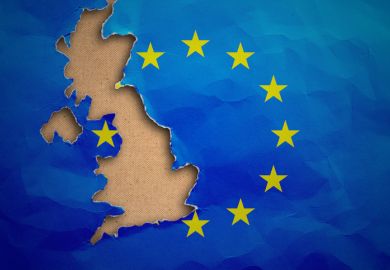A UK university has launched two major teaching and research collaborations with higher education institutions in Paris and Brussels, amid concern about the slow pace of Brexit negotiations.
The University of Warwick said on 28 March that it would create a number of joint degrees, joint PhD studentships and joint early career research fellowships with the University of Paris Seine and Vrije Universiteit Brussel.
The collaboration will also see the appointment of a mathematics lecturer at Paris Seine, who will spend three months of the year at Warwick, and the start of several new student exchanges and teaching and research link-ups.
Stuart Croft, Warwick’s vice-chancellor, said that the uncertainty around the UK’s involvement in the European Union research and mobility projects beyond 2020 had underlined the need for universities to build their own bilateral projects.
“Politicians in and out of office in every country in Europe are still deliberating how the UK can still be part of [these projects] in future but we can’t afford simply to wait for that to be fully resolved,” Professor Croft said. “We chose to act now not just to show our commitment to work together in future but to begin work on a range of activities that deliver on such a commitment.”
Seán Hand, deputy pro-vice-chancellor (Europe) at Warwick, told Times Higher Education that, while the university’s new partnerships were “Brexit-related”, they represented more than “just a reaction to Brexit”.
“Brexit has focused people’s minds on what is truly valuable and what they feel passionate about – these international collaborations affirm what we are about as a university, as well as the importance of Europe [to UK academia],” said Professor Hand.
Warwick “has been an international [university] from its beginning” with one of its founding department heads in 1966 coming from overseas, said Professor Hand, who added that it still had a high proportion of non-UK EU academics among its faculty.
Warwick has had a teaching base in Venice for history and history of art students for 40 years, and has occupied the 15th-century Palazzo Pesaro-Papafava since 2007.
Several other UK universities have established closer collaborations with European research institutions since the Brexit vote, with Imperial College London opening a joint mathematics laboratory with the French National Center for Scientific Research, the University of Oxford creating an alliance with four universities in Berlin, and King’s College London considering opening a branch campus in Dresden.
Commenting on the new partnership between Warwick and Vrije Universiteit Brussel, its rector Caroline Pauwels said that the collaboration indicated a desire for closer academic links between the UK and Europe.
“Politicians in Europe may choose to go their own way, but we as academics choose to move in the other direction,” said Professor Pauwels. “We don’t build walls between our universities and societies. We break them down.”
Register to continue
Why register?
- Registration is free and only takes a moment
- Once registered, you can read 3 articles a month
- Sign up for our newsletter
Subscribe
Or subscribe for unlimited access to:
- Unlimited access to news, views, insights & reviews
- Digital editions
- Digital access to THE’s university and college rankings analysis
Already registered or a current subscriber?








